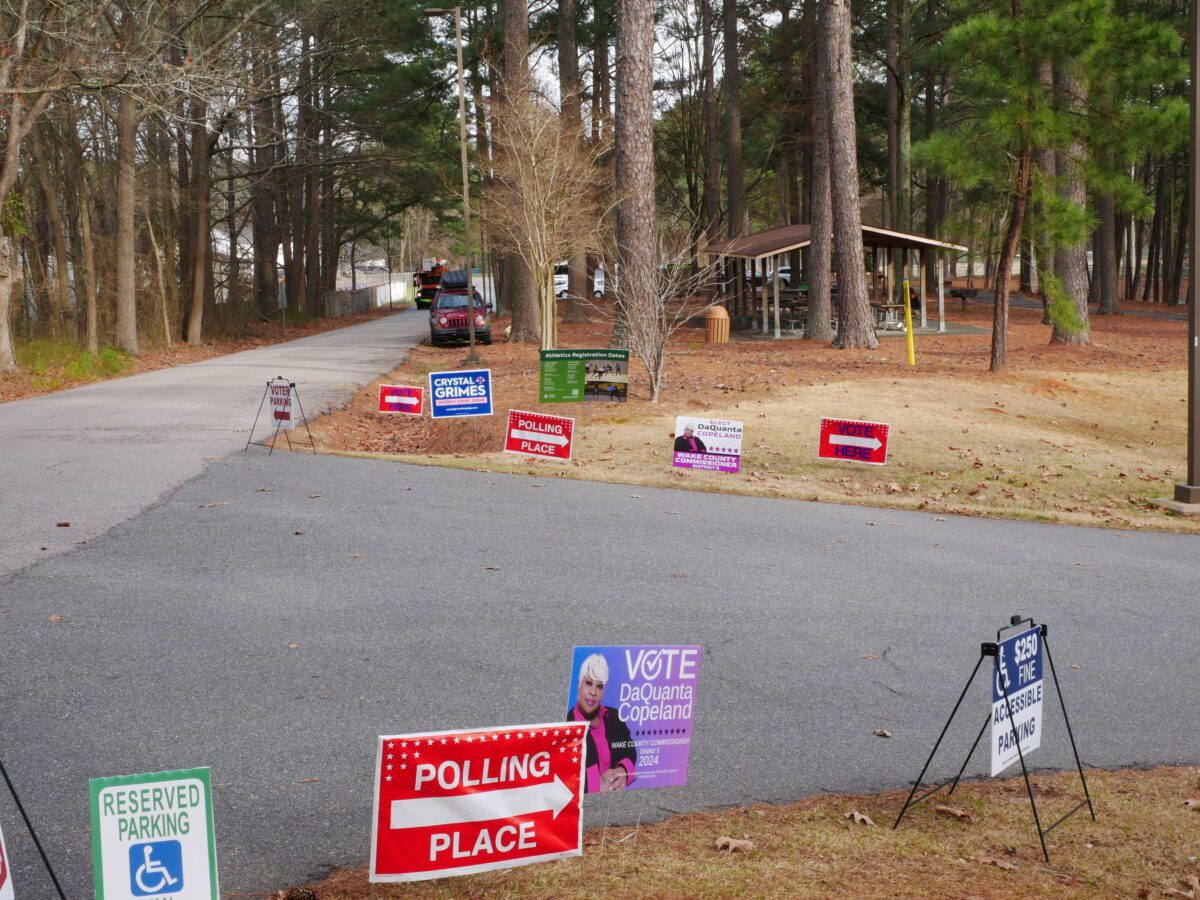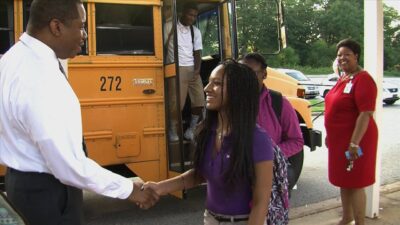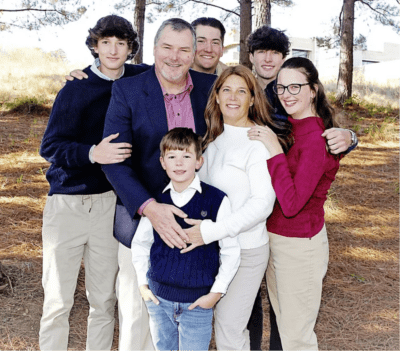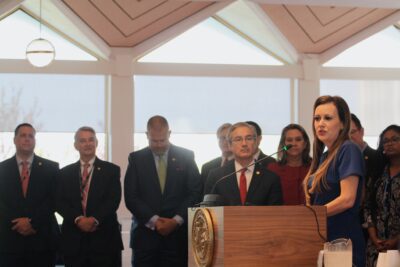
The March 5 primary election had many offices critical to the future of North Carolina’s education on the ballot. With 100% of precincts reporting, the results are in.
This year’s primary turnout in North Carolina was lower than last Super Tuesday with a 24% turnout rate compared to 31% in 2020.
The seats of governor, lieutenant governor, state treasurer, attorney general, and superintendent of public instruction all play an important role in North Carolina’s public schools and institutions of higher education.
Election results funneling in Tuesday night determined North Carolina will have a new superintendent in 2024 after an upset in the Republican primary unseated the incumbent.
Winners of the primaries will move on to the Nov. 5 general election.
![]() Sign up for the EdWeekly, a Friday roundup of the most important education news of the week.
Sign up for the EdWeekly, a Friday roundup of the most important education news of the week.
State superintendent
Candidate Michele Morrow, a nurse and homeschool educator, defeated incumbent Catherine Truitt in the Republican primary race for superintendent of public instruction.
Morrow received just over 52% of votes, securing her place on the ballot in November. Truitt has served as state superintendent since 2021.
Morrow posted this statement about her win on social media:
Truitt released this statement to Facebook on her defeat:
The Democratic primary for the seat saw Maurice (Mo) Green win over candidates C.R. Katie Eddings and Kenon Crumble. Green, an attorney and former superintendent of Guilford County Schools, earned about 66% of the votes.
Green posted this message to Twitter, now X, in response to his win:
Recommended Reading


Governor
Josh Stein won the Democratic primary for governor over candidates Michael (Mike) Morgan, Chrelle Booker, Marcus Williams, and Gary Foxx. Stein, who has served as North Carolina’s attorney general since 2017, earned around 70% of votes.
Current Lt. Gov. Mark Robinson won the Republican primary for governor, garnering almost 65% of the vote and defeating candidates Dale Folwell and Bill Graham.
Lieutenant governor
Rachel Hunt won the Democratic primary for lieutenant governor with over 70% of votes, winning over candidates Ben Clark and Mark H. Robinson.
The Republican primary for lieutenant governor was far more crowded with 11 total candidates and may likely go to a runoff after no candidate exceeded the threshold of votes needed to avoid the possibility of a second primary.
Candidate Hal Weatherman is leading the race with nearly 20% of the votes, with the next runner up Jim O’Neil taking close to 16% of votes. Under North Carolina law, in a race where candidates fail to win more than 30% of votes, a runner up has to call for a runoff election to be held.
According to the N.C. State Board of Elections, “a second primary, if necessary for any contests, would take place on May 14, 2024.”
Attorney general
Republican Dan Bishop, an attorney who formerly served in the N.C. Senate and the U.S. House of Representatives, ran unopposed in the Republican primary and thus did not appear on ballots on Tuesday.
Democrat Jeff Jackson will face Bishop in November after winning the Democratic primary for attorney general with around 55% of the votes. Jackson defeated candidates Satana Deberry and Tim Dunn.
State Treasurer
N.C. Rep. Wesley Harris won the democratic primary for State Treasurer with nearly 67% of votes, winning over candidate Gabriel Esparza.
Brad Briner won the Republican primary over Rachel Johnson and AJ Daoud with almost 40% of votes.
![]() Sign up for the EdWeekly, a Friday roundup of the most important education news of the week.
Sign up for the EdWeekly, a Friday roundup of the most important education news of the week.
Other races of interest
Incumbent At-Large Mecklenburg County Commissioner Pat Cotham lost the Democratic primary for her seat. Cotham has been on the commission for more than 10 years but faced pushback after her daughter, Rep. Tricia Cotham, switched to the Republican Party from the Democratic Party last year, handing legislative Republicans a supermajority.
Three candidates led the votes with Leigh Altman winning about 26%, Arthur Griffin, Jr. winning about 25% and Yvette Townsend-Ingram winning about 24%.
In the Democratic primary for N.C. House of Representatives District 27, social studies teacher Rodney Pierce won by a narrow margin with just 42 more votes than opponent Michael Wray, placing the race within the threshold for a mandatory recount.
‘A purple state without many purple candidates‘
Western Carolina University political science and public affairs professor Christopher Cooper said he was and remains surprised at Morrow’s victory over Truitt, adding that her win indicates a very “MAGA-friendly” electorate took to the polls on Tuesday.
“It’s pretty unusual to knock an incumbent off. It’s even more unusual to knock off an incumbent in a primary in a lower salience election where people tend to know less about the candidates in the office. And it’s even less likely to pull off that upset when you’re outraised eight to one,” Cooper said. “Despite all three of those things, Michele Morrow won.”
Cooper said lower voter turnout meant the voters who did show up tend to be less moderate and more firmly situated on party lines.
Democratic voters followed the same trend as Republicans, according to Cooper, with voters also selecting more progressive candidates over more moderate ones. However, fewer votes were cast in the Democratic primary compared to the Republican Primary.
According to Carolina Demography, 36.3% of North Carolina voters were registered as unaffiliated in 2023. Unaffiliated voters may vote in either primary in North Carolina.
Cooper said voters selecting more “extreme” candidates on either side will lead to an “interesting” November for North Carolina voters.
“You’re going to have a purple state without many purple candidates on the ballot,” Cooper said. “Whether that drives up turnout because of negative partisanship — the idea that you want to vote the other person out — or whether that depresses turnout because moderate voters don’t like their choices, I think that remains to be seen. But it’s going to be an interesting juxtaposition regardless.”
Editor’s note: This article was updated on March 6 to include an interview with professor Christopher Cooper.
Recommended reading



